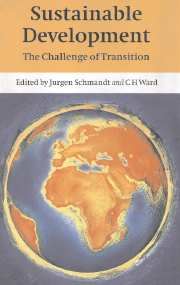Book contents
- Frontmatter
- Contents
- List of contributors
- Foreword
- Preface
- 1 Challenge and response
- 2 National self-interest in the pursuit of sustainable development
- 3 Uneconomic growth: Empty-world versus full-world economics
- 4 Population and consumption: From more to enough
- 5 Spirituality and sustainability
- 6 Leadership skills for sustainable development
- 7 The role of science: Guidance and service
- 8 Economic tools, international trade, and the role of business
- 9 Stakeholders and sustainable development
- 10 From idea to action: The role of policy
- Index
8 - Economic tools, international trade, and the role of business
Published online by Cambridge University Press: 17 August 2009
- Frontmatter
- Contents
- List of contributors
- Foreword
- Preface
- 1 Challenge and response
- 2 National self-interest in the pursuit of sustainable development
- 3 Uneconomic growth: Empty-world versus full-world economics
- 4 Population and consumption: From more to enough
- 5 Spirituality and sustainability
- 6 Leadership skills for sustainable development
- 7 The role of science: Guidance and service
- 8 Economic tools, international trade, and the role of business
- 9 Stakeholders and sustainable development
- 10 From idea to action: The role of policy
- Index
Summary
The market sometimes fails. That is one of the calamities of capitalism. In the final years of the twentieth century, the market economy has swept the world, becoming the near-universal economic system. It has brought the benefits of choice and consumer sovereignty. It has stimulated unprecedented economic growth. But, while it has improved the living standards of millions of people around the world, the market economy offers little protection for the environment. Left to its own devices, the market delivers more pollution along with more goods and services.
To be honest, non-market economies (such as the Soviet Union) were never very good at protecting the environment either. The industrial cities left by Communism, with their heavy industries, their steel plants, and coal mines, are among the dirtiest in the world. Such protection as the environment enjoyed in the non-market nations came mainly from poverty: people were too poor to buy cars, generate garbage or build extensive new housing developments.
But market economies often deliver wealth at the expense of nature. What happens is that polluters do not carry the full cost of their actions. If a company tips waste into a river, it saves the cost of waste disposal and imposes it instead on the people who live downstream, or the municipalities that have to find other water supplies. If a coal-fired power station emits sulfurous fumes, the cost is carried by those who enjoy or make their living from forests downwind of it.
One of the biggest policy dilemmas for environmentalists is therefore how best to combine economic growth with greenery: how to rectify market failures without losing the benefits that the market also brings.
- Type
- Chapter
- Information
- Sustainable DevelopmentThe Challenge of Transition, pp. 153 - 174Publisher: Cambridge University PressPrint publication year: 2000
- 1
- Cited by



